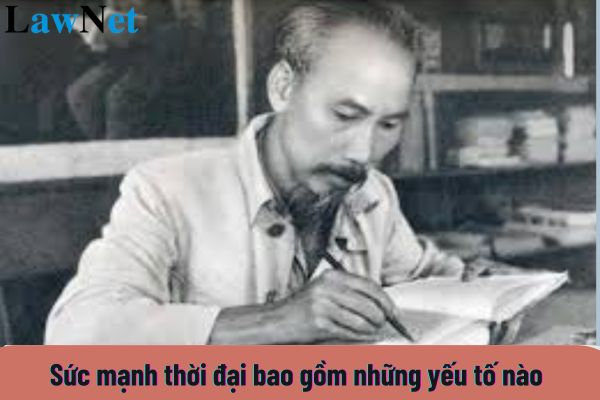According to President Ho Chi Minh, what elements constitute the strength of the era? What are the research subjects of Ho Chi Minh Thought?
According to President Ho Chi Minh, what elements constitute the strength of the era?
The strength of the era, in the viewpoint of President Ho Chi Minh, is a combination of objective factors, and general development trends in history and humanity, creating favorable conditions for the development of revolutions, including the Vietnamese revolution.
Students may refer to the following information about elements constituting the strength of the era according to President Ho Chi Minh:
|
According to President Ho Chi Minh, what elements constitute the strength of the era? The strength of the era includes: |
*Note: The information is for reference only./.

According to President Ho Chi Minh, what elements constitute the strength of the era? What are the research subjects of Ho Chi Minh Thought? (Image from the Internet)
What are the research subjects of the Ho Chi Minh Thought?
Under Section 1 of the Ho Chi Minh Thought curriculum promulgated under Decision 52/2008/QD-BGDDT, the research subjects of Ho Chi Minh Thought are as follows:
Research subjects
1. Concepts of thought and Ho Chi Minh Thought
a) Concept of thought and thinker
- Concept of thought
- Concept of thinker
b) Definition and system of Ho Chi Minh Thought
- Definition of Ho Chi Minh Thought
- System of Ho Chi Minh Thought
- Core of Ho Chi Minh Thought
2. Research subjects of the Ho Chi Minh Thought subject
a) System of theoretical perspectives of Ho Chi Minh
b) Movement of Ho Chi Minh Thought in the practice of the Vietnamese revolution
3. Relationship of this subject with the subject The Basic Principles of Marxism-Leninism and the subject Revolutionary Path of the Communist Party of Vietnam
- Relationship with the subject The Basic Principles of Marxism-Leninism
- Relationship with the subject Revolutionary Path of the Communist Party of Vietnam
Thus, according to the above regulation, the research subjects of the Ho Chi Minh Thought include:
- System of theoretical perspectives of Ho Chi Minh
- Movement of Ho Chi Minh Thought in the practice of the Vietnamese revolution
What is the process of formation and development of Ho Chi Minh Thought?
Under Section 2 of the Ho Chi Minh Thought curriculum promulgated under Decision 52/2008/QD-BGDDT, the process of formation and development of Ho Chi Minh Thought is defined as follows:
*Period before 1911: Formation of patriotic fervor and the ambition to save the nation
- Absorbing traditions of family, hometown, and country
- Lessons of success and failure drawn from struggles against the French
- Nurturing patriotic zeal and determination to embark on finding a new path to save the nation
*Period from 1911-1920: Finding the path to national salvation and liberation
- Going to France and European countries, the birthplace of ideas of liberty, equality, philanthropy
- Persevering through hardships, striving to study and survey practical realities
- Participating in progressive political and social organizations
- Studying world revolutions
- Embracing Leninism and agreeing to join the Third International, finding the right path to save the nation
*Period from 1921-1930: Formation of basic thoughts on the Vietnamese revolution
- Continuing activities and studying Marxism-Leninism
- Combining research with building theory
- Forming a system of viewpoints on the Vietnamese revolution
*Period from 1930-1945: Overcoming challenges and steadfastly maintaining the revolutionary stance
- Maintaining perspective despite the "leftist" tendency of the Communist International
- Closely following the situation to direct the domestic revolution
- Building and perfecting the strategy for national liberation revolution, establishing the thought of independence, and freedom leading to the victory of the August Revolution
- Thoughts on fundamental national rights (in the Declaration of Independence)
*Period from 1945-1969: Continuation and perfection of Ho Chi Minh Thought
- Thought on combining resistance with nation-building
- Thought on people's war, comprehensive, prolonged resistance relying mainly on oneself
- Thought on socialism and the transitional path to socialism
- Building a state of the people, by the people, for the people
- Thoughts and strategies on human resources by Ho Chi Minh
- Building the Communist Party as a ruling party
- On international relations and foreign policy strategies...

